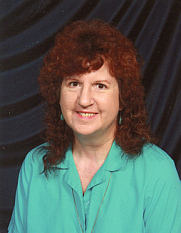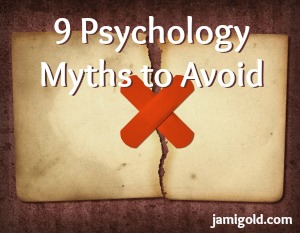If we don’t want to write characters who are too perfect, we have to layer in a few flaws. The Negative Trait Thesaurus by Angela Ackerman and Becca Puglisi is full of ideas for how to make our characters seem more real with a mix of traits, including weaknesses.
That goal of avoiding the too-perfect character means that we might be writing characters who are “broken” in some way. They might be trauma survivors or suffering from depression, etc.
While psychological issues can be great for rounding out our characters and creating conflict, we don’t want to get the details wrong. Real people with real psychological disorders might be among our readers, and we don’t want to twist or belittle their struggles.
Luckily, I know just who can help us get this right. *smile* Writer and retired psychotherapist Kassandra Lamb visited us here before with her Emotions 101 for Writers guest post, and now she’s here with information about what writers often mess up about psychology.
Please welcome Kassandra Lamb! Woo hoo!
*****
9 Common Errors
Authors Make about Psychological Disorders
As a retired psychotherapist, I cringe sometimes when I read inaccurate references to psychological phenomena in fiction. But as an author, I know how hard it is to get every detail right. We can’t all be experts in every field, and I’ve certainly made some cringe-worthy errors in areas outside my own expertise.
Today, I want to correct several misconceptions about psychology and psychological disorders that I’ve seen misrepresented in fiction.
#1: Schizophrenia and multiple personalities are not the same disorder.
This common mistake is understandable because this misconception is widespread in our society.
However, it is not a forgivable mistake in the eyes of those readers who know a bit about psychology. It immediately exposes the author as someone who hasn’t done their research.
These two disorders couldn’t be more different. Schizophrenia is primarily a genetically-transmitted, biologically-based disorder that causes the person’s brain to malfunction. It is true psychosis. The person is out of touch with reality. Schizophrenics have delusions, hallucinations, their speech may not make sense, etc.
The correct diagnosis for people who have multiple personalities is Dissociative Identity Disorder (DID). This disorder is caused primarily by extreme childhood trauma. Although their perceptions may be distorted because of past trauma, people with DID are not psychotic.
#2: Schizophrenics and people with DID are rarely dangerous to anyone but themselves.
It makes me grind my teeth when a perfectly normal-seeming character is revealed at the end of the book to have DID and one of the personalities is a pathological killer.
In DID, the different personalities are called alters. And they are indeed quite different, with different traits and also suffering from different mental disorders themselves. One alter may be very anxious, another depressed, etc. However, it is highly unlikely that one, and only one, of the personalities will be a psychopath (more on psychopaths in a minute). As a matter of fact, I’ve never even heard of such a case in real life. (Although serial killer Ted Bundy tried to fake that he had multiple personalities in order to get off.)
Ninety-eight percent of the time, schizophrenics are quite harmless. The only time that they are likely to become dangerous is if they are having a delusion and/or hallucination that leads them to believe that other people are a threat to themselves, their families or their country—such as believing that their neighbors are really aliens from another planet sent here to take over the Earth.
#3: Bipolar, depression, and manic-depressive are not synonyms.
Depression is considered the common cold of mental disorders, because everybody has it at times. Most authors are familiar with it, and I’ve rarely seen its symptoms misrepresented in fiction. But sometimes its causes are.
It can be caused by life events (past or present), inherited biological factors (faulty brain chemistry) or by some of both. A character with severe, recurrent or chronic depression should either have a lot of nasty crap stuffed in their psychological closet and/or have a family history of depression.
Depression is a part of bipolar disorder but the two disorders are not synonymous. Bipolar disorder is far less common. It’s genetically transmitted and primarily biologically based. It involves mood swings between moderate to severe mania and moderate to severe depression. If there is no mania involved, it’s not bipolar.
Manic-depressive is the old name for this disorder. An everyday person will use this term but a medical or mental health professional will not, unless they are using it to explain bipolar disorder to a lay person.
#4: Yes, people who are really suicidal do talk about killing themselves.
It is a total myth that people who talk about suicide aren’t really serious about killing themselves. Yes, they are.
Most people who eventually attempt suicide have talked about wanting to die, wishing they had the guts to kill themselves, etc. quite a bit. I think the myth comes from the fact that once the person has actually decided to do it, often they stop talking about it. Because now they don’t want anyone to stop them.
#5: Neither “psychopath” nor “sociopath” are true diagnoses.
These two terms were once official diagnostic labels, but they were replaced decades ago by antisocial personality disorder. However, the two terms have stuck in the general vernacular. So lay people may use either term interchangeably.
But a psychological or medical professional wouldn’t, at least not in any official capacity. However, we do sometimes use these terms when dealing with the lay public, mainly because it’s easier to say “psychopath” than “a person with antisocial personality disorder.”
#6: Not all nasty, abusive people are psychopaths (i.e. have antisocial personality disorder, abbreviated as ASPD).
Often they have other personality disorders, such as narcissism. The key difference between people with ASPD and these other personality disorders is the lack of a conscience. Psychopaths, i.e. people with ASPD, do not experience much in the way of remorse or guilt. (For more on the nature of psychopaths and the causes of ASPD, see my posts on the subject here and here.)
Let’s get back to why a person with DID is unlikely to have only one psychopathic personality.
Antisocial personality disorder is partially genetically transmitted. There is something intrinsically wrong with the person’s wiring that interferes with the development of a conscience. As I said, I’ve never heard of a real case of someone with DID who had only one truly psychopathic personality. But I have heard of a case of a man with DID in whom all his personalities lacked a conscience.
#7: Not everything negative that happens is a trauma and PTSD is not triggered by mild to moderate trauma.
We tend to use the word traumatic a bit loosely to refer to anything upsetting, like receiving a bad grade in a course. The definition of a trauma is an event so emotionally overwhelming (usually sudden and unexpected) that we cannot process it emotionally or cognitively at the time the event occurs.
The definition of trauma related to Post-Traumatic Stress Disorder is even stricter–a traumatic event is one in which “the physical integrity of oneself or others” is threatened. In other words, somebody gets hurt or killed, or you’ve got good reason to believe that someone is about to get hurt or killed.
The most common causes of PTSD are combat, child abuse, serious car accidents, being the adult victim of a violent crime (including domestic violence), and natural disasters.
#8: Yes, people’s minds really can block out an entire traumatic memory.
Indeed, people can experience traumatic amnesia for whole months, years or even their entire childhood. When I was a psychotherapist, the statement that was most likely to fill me with dread was: “I really don’t remember much of my childhood.”
This amnesia is a product of a defense mechanism called dissociation, which blocks out anything that is too emotionally overwhelming. If you’ve ever felt spacey after a moderately traumatic event, you’ve experienced dissociation in its mildest form.
Dissociative amnesia is well documented, has been researched for over a hundred years, and is officially recognized by the diagnostic manual of mental disorders.
Sadly, a movement was started in the 1990’s to discredit the previously dissociated memories of child sexual abuse survivors. This movement was spearheaded by—wait for it—parents whose adult children had accused them of child abuse.
But most members of the general public didn’t know that, and the group leading the charge was represented as a “research organization.” So the idea was planted in the public’s mind that the whole concept of traumatic amnesia is bogus.
Sorry, this whole movement was bogus. But unfortunately once an idea gets a foothold in the public mentality, it’s hard to shake it loose.
(For an exploration of the horrendous impact of this “false memory” movement on sexual abuse survivors and their therapists, see my novel, Family Fallacies, A Kate Huntington Mystery.)
#9: Human memory is a fickle thing!
We tend to see human memory as much more infallible than it is. In reality, our brains normally do not record events as if they were cameras or video recorders.
Indeed, human memory is quite fallible. It is biased by the perceptions of the person at the time it’s recorded, distorted by the passage of time, and susceptible to suggestion at the time of recall.
One misconception about memory that is perpetuated in fiction (and especially on TV) is that eyewitness accounts are trustworthy.
They’re not. The most infamous real-life example of this was a woman who swore a certain man had broken into her house and raped her. Turned out he was the guest on a live talk show she was watching on TV at the time of the break-in. Several hundred people in the studio audience could verify his alibi!
(Unfortunately, law enforcement and the courts all too often rely more heavily on eyewitness accounts than they should.)
Also, people assume that the memory of a traumatic event is less accurate than normal memory because the person is upset. In reality, traumatic memory is more accurate. During a traumatic event, because the mind isn’t processing the event at the time, the data is stored in its raw form. In other words, it is the one instance when the memory is imprinted on the mind like a photograph!
Bonus #10: Patient confidentiality is important.
(Jami’s note: This comes from one of Kassandra’s comments below.)
Therapists take confidentiality very seriously. It drives me nuts when I see fictional ones sharing information about clients without a release or a court order, and without even giving it a second thought.
The Problem of Readers Thinking We Got It Wrong
Let me end by saying that unfortunately it is not enough to portray these psychological phenomena accurately. Because some of these misconceptions are so ingrained in our society, it becomes necessary sometimes to address the misconceptions in your story. Otherwise that part of the general public who believes the misconception will think you’ve got it wrong. But if you go with the misconception, those folks with any background in psychology whatsoever will know you’ve got it wrong.
Fortunately for me, this dilemma is easily addressed because my protagonist is a psychologist. I just have her speak up and set the record straight. *smile*
*****
 Writing and psychology have always vied for number one on Kassandra Lamb’s Greatest Passions list. In her youth, she had to make a decision between writing and paying the bills. Partial to electricity and food, she studied psychology. Now retired from a career as a psychotherapist and college professor, she spends most of her time in an alternate universe with her characters. The portal to this universe (aka her computer) is located in Florida where her husband and dog get occasional glimpses of her. She and her husband also spend part of each summer in her native Maryland, where the Kate Huntington mysteries are set.
Writing and psychology have always vied for number one on Kassandra Lamb’s Greatest Passions list. In her youth, she had to make a decision between writing and paying the bills. Partial to electricity and food, she studied psychology. Now retired from a career as a psychotherapist and college professor, she spends most of her time in an alternate universe with her characters. The portal to this universe (aka her computer) is located in Florida where her husband and dog get occasional glimpses of her. She and her husband also spend part of each summer in her native Maryland, where the Kate Huntington mysteries are set.
Find Kass on Twitter and Facebook, sign up for updates on Kate’s World at Kass’s website, and check out her posts on psychological topics and other random things at the misterio press site.
*****
 Thanks so much, Jami, for letting me borrow your blog today! And as a thank you to your readers for their attention, I’ve put my romantic suspense thrillogy, Love and Murder, on sale for a couple of days!
Thanks so much, Jami, for letting me borrow your blog today! And as a thank you to your readers for their attention, I’ve put my romantic suspense thrillogy, Love and Murder, on sale for a couple of days!
A sweet love story! Three great whodunnits to keep you guessing. All for just $0.99!
Newly widowed Kate Huntington is sure that romance is a thing of the past for her. How could anyone replace her beloved husband? But when she reconnects with the hunk of a bodyguard who protected her from her late husband’s killer, she isn’t sure of anything anymore. The man is now a private investigator, and he’s just as drop-dead gorgeous as ever. But it’s way too soon after Eddie’s death.
There’s only one thing that P.I. Skip Canfield knows for sure. He’s fallen hard for the young widow Kate Huntington. What he doesn’t know is legion. Can his love banish the ghost of her dead husband? Can he win her despite the disapproval of her male best friend? And most important of all, can he stop three killers bent on their destruction?
Amazon US | Amazon UK | Barnes & Noble | Kobo | Apple
*****
Thank you, Kassandra! I’m one of those authors who writes broken characters sometimes, so it’s great to get the scoop on these common myths about psychological disorders.
#9 struck me the most, as you’re right that we all greatly overestimate the accuracy of our memory. I do have a near-photographic memory (to the point that letting a story “rest” to get a fresh look at it doesn’t work for me), and I still get things wrong all the time.
Yet what choice do we have? Everything we believe about who we are is based on our memory. So the world, something we’re even less aware of than ourselves, can only be known through our memories and our senses, fallible though they are.
Kind of makes us understand that human psychology isn’t as cut and dried as the myths would lead us to believe. But hopefully, information like this gives us a head start. *smile*
Do you have any questions for Kassandra? Are there other psychological topics you’ve run across in fiction that you’ve wondered if they were valid? Have you seen authors get things wrong about psychology? How about other things, such as from your own areas of expertise? What makes you cringe when you see it misrepresented in fiction?

